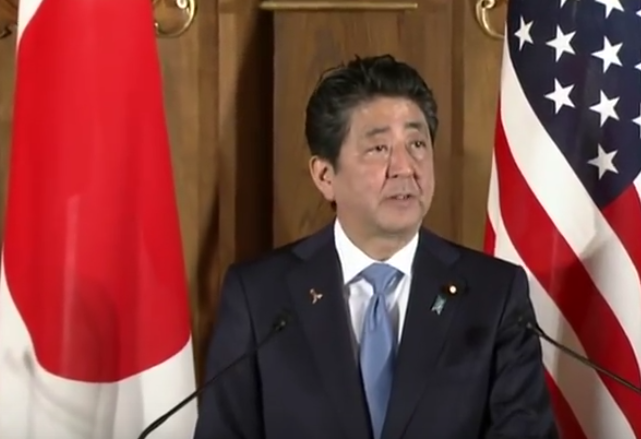Trump to meet Japan’s Abe to discuss trade, North Korea
Japan’s position as trading partner enhanced by find of ‘semi-infinite’ deposit of rare-earth minerals.

Japanese Prime Minister Shinzo Abe is meeting with President Trump at in Mar-a-Lago, with trade and North Korea being two of the key topics the leaders will discuss.
Abe is set to arrive Tuesday at Trump’s winter resort in Palm Beach, Fla., for two days of meetings as concerns mount in Tokyo that Trump’s risky diplomatic gambit with Kim Jong Un could undermine Japan’s security. Abe also was blindsided by Trump’s decision not to grant Japan a waiver on new steel and aluminum tariffs, as he did for other U.S. allies and partners.
The double-whammy amounted to a gut punch for Abe and left some in Tokyo questioning his strategy of cozying up to the mercurial American president. Abe was the first foreign leader to visit Trump after the election, and the two have met and spoken 20 times — more interactions than Trump has had with any other world leader. It is Abe’s second visit to Mar-a-Lago, after meetings and a round of golf last year.
As Trump likes to negotiate, Abe now has the means to make an effective deal. Researchers have found a deposit of rare-earth minerals, critical for all the new technology the US and much of the world relies upon, off the coast of Japan that could supply the world for centuries.
The study, published in the journal Nature on Tuesday, says the deposit contains 16 million tons of the valuable metals.
Rare-earth minerals are used in everything from smartphone batteries to electric vehicles. By definition, these minerals contain one or more of 17 metallic rare-earth elements (for those familiar with the periodic table, those are on the second row from the bottom).
These elements are actually plentiful in layers of the Earth’s crust, but are typically widely dispersed. Because of that, it is rare to find any substantial amount of the elements clumped together as extractable minerals, according to the USGS. Currently, there are only a few economically viable areas where they can be mined and they’re generally expensive to extract.
The Japanese mud is a virtual cornucopia of rare elements, which will make it a competitor with China once the technology to extract the compounds is enhanced.
Japanese researchers estimate the roughly 2499-square-kilometer region of seabed holds more than 16 million tons of rare earth oxides, including 780 years’ worth of the global supply of yttrium, 620 years’ worth of europium, 420 years’ worth of terbium, and 730 years’ worth of dysprosium, they write this week in Scientific Reports.
The find could challenge China’s dominance on the rare earths’ world market, but extracting such metals from seabed sludge is expensive and difficult; scientists say it could take up to 5 years to figure out the best method.
When asked about whether the discussion will include the Trans-Pacific Partnership agreement, Press Secretary Sarah Sanders had this response:
I’m not going to get ahead of anything that may or may not happen in the meeting. But as the President said, he wants to make sure we have good trade deals, and we’ll see what that looks like.
Abe has been facing political difficulties at home, which may be part of the impetus for the trip.
Just before Abe headed to the United States, typically tame demonstrators in Tokyo made an unusual show of defiance, breaking through police barricades to get closer to Japan’s parliament, the Diet, to protest the prime minister’s leadership. In cities around the country, an estimated 50,000 Japanese took part in demonstrations calling on Abe to resign. Their posters read, Abe, “You’re a liar.”
…A Nippon TV poll released Sunday shows support of Abe and his cabinet has fallen to 26.7 percent — the lowest since he took office in December 2012.
“He’s got these two cronyism scandals brewing in the Diet, suddenly he gets whacked by Trump. It’s been a bad couple of months for Prime Minister Abe,” says Jeff Kingston, who is Asia studies director at Tokyo’s Temple University.
Hopefully, this will be a golden meeting for both men and both nations…perhaps with traces of europium, terbium, and yttrium.
 DONATE
DONATE
Donations tax deductible
to the full extent allowed by law.








Comments
“Japan’s position as trading partner enhanced by find of semi-infinite’ deposit of rare-earth minerals.”
Or “trade good”.
Remember a few years ago when China greatly restricted important rare earth materials? It would be great if this results in a Chinese attitude adjustment.
Good for Japan, they need a break. Now if they can extract the minerals from that depth.
And Japan has environmental and labor standards comparable to our own, which engender a functional market and equitable trade.